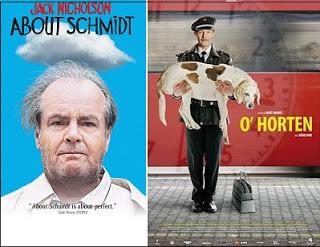
About Schmidt Released 2002; O'Horten Released 2007.
After watching over 200 films depicting midlife and late life, I'm seeing patterns.Sometimes one film influences another. For example, Make Way for Tomorrow (1937) has a strong influence on two subsequent films.
Other films are direct remakes, such as the 2014 English-language version of the 2005 Spanish film Elsa y Fred.
In this instance, I see two characters taking different approaches to the same life passage. For this reason, I recommend that people watch About Schmidt (2002) and O'Horten (2007) back to back--but necessarily in the same evening.
Schmidt and O'Horten are both men who retire at the beginning of their narratives. Nebraska native Schmidt worked at a insurance company for decades before retiring at age 66. Norway native O'Horten worked as a train conductor for decades before retiring at age 67.
Both men exhibit highly ingrained habits at work and at home. Both men experience personal chaos because of the loss of their workplace routines. This leads both men to question everything from their identity to their relationships to society at large.
What differs is their path through that chaos.
I leave it to viewers to discover how these men respond to the challenges of late midlife. Both films are understated, giving viewers plenty of opportunity to meditate about the significance of the characters and their adventures. Both films contain a bit of satire, which puts some demands on the viewers.
I loved both of these films. I found it difficult to sleep after watching each of them. I kept reviewing specifics of the film.
O'Horten is visually rich. The images from that film danced in my imagination for hours. The denouement was fairly straightforward, so I didn't have to think a lot about the moral of the story. I did find it necessary to reconsider the significance of some minor characters, particularly Trygve, the drunk, rich man that O'Horten finds sleeping in the snowy street.
About Schmidt in particular contained a lot of ambiguity. Does the character achieve real growth? Or does his just go through the motions of personal development without really transforming? Director Alexander Payne isn't very forthcoming in answering that question. His film received a Golden Globe Award for Best Screenplay and Best Actor in a Drama as a result.
If you are interesting in exploring the identity crises that emerge upon retirement, rent these films and watch them over a weekend. They're thought provoking and contain some excellent acting.
Related:
Films About Aging

